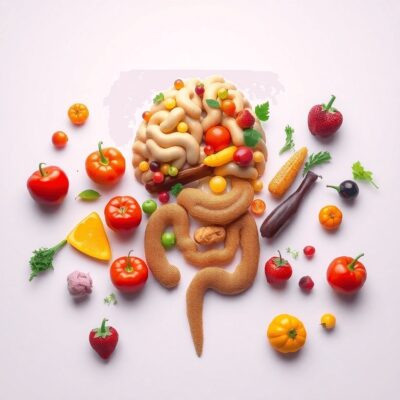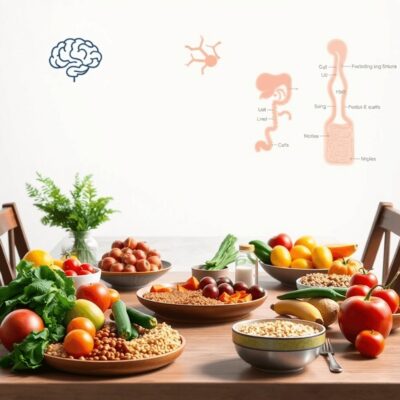The Mind-Gut Connection
The mind gut connection refers to the intricate relationship between your brain and gastrointestinal (GI) system. This dynamic interplay is facilitated by the gut-brain axis, a network of neurons and chemical signals that communicate between these two vital systems. Understanding this connection sheds light on how mental health can influence digestive functions and vice versa.
Why the Mind-Gut Connection Matters
Recognizing the significance of the mind-gut connection is crucial. It emphasizes the role of emotional well-being in maintaining digestive health and highlights how gastrointestinal issues can impact mood and behavior. For instance, stress or anxiety can trigger gut-related symptoms such as irritable bowel syndrome (IBS), while gut health can affect mental states, contributing to conditions like depression or anxiety.
Benefits of Understanding the Mind-Gut Connection
By delving into this relationship, you gain insights into the potential root causes of various health issues, paving the way for more holistic treatment approaches. This understanding encourages an integrated view of health, where both mental and physical wellness are considered essential for overall well-being.
Empowering Health Decisions
Embracing this knowledge empowers you to make informed decisions about lifestyle changes that support both your mind and gut, fostering a balanced approach to health.
Understanding the Mind-Gut Connection
The mind-gut connection is an intriguing relationship between your brain and digestive system, often referred to as the gut-brain axis. This connection involves complex communication between the brain and gut, where the brain affects gut function and, in turn, gastrointestinal health influences mental well-being.
A Historical Perspective
The idea that our emotions and digestive processes are linked goes back a long way. In recent years, research has shed light on just how deep this connection is. Studies on patients with conditions like irritable bowel syndrome (IBS) have shown how psychological factors such as stress can worsen physical symptoms. Such findings underscore the importance of understanding the neurobiological aspects of this connection.
How It Works: The Science Behind the Connection
The gut-brain axis operates through various physiological interactions involving:
- Neural pathways: These are the routes through which nerve signals travel between the brain and gut.
- Hormones: Chemical messengers that regulate numerous bodily functions, including those related to digestion and mood.
- Immune signals: Communications from the immune system that can impact both gut health and mental state.
A key player in this system is the enteric nervous system (ENS)—often referred to as our “second brain.” The ENS works independently but also has a dialogue with the central nervous system (CNS), which comprises the brain and spinal cord. This two-way communication not only aids digestion but also plays a role in regulating our moods.
Why It Matters: The Importance of Gut Health for Mental Well-Being
This intricate network highlights why it’s crucial to maintain a healthy gut environment for optimal mental health. As science continues to explore these connections, it becomes increasingly evident that caring for both our minds and digestive systems is vital for overall well-being.
Understanding this relationship opens up new possibilities for effectively treating both psychological and gastrointestinal disorders.
The Enteric Nervous System (ENS) as Our Second Brain
The enteric nervous system (ENS) is often referred to as our “second brain” due to its vast network of neurons and complex role in regulating digestive processes. Situated within the walls of the gastrointestinal tract, the ENS comprises approximately 500 million neurons, which is more than the spinal cord.
Role in Digestion and Communication with the CNS
- Digestive Processes: The ENS autonomously manages various digestive functions such as peristalsis, enzyme secretion, and nutrient absorption. It ensures smooth coordination of these activities without direct input from your central nervous system (CNS).
- Communication with CNS: Despite its autonomy, the ENS continuously communicates with the CNS through the vagus nerve. This bidirectional communication facilitates a seamless exchange of information between your gut and brain, impacting both physical and emotional states.
Functions of Neurons in the ENS
- Sensory Neurons: Detect changes in gut content such as acidity and nutrient levels.
- Motor Neurons: Control muscle contractions to push food through your digestive tract.
- Interneurons: Act as messengers, linking sensory inputs with motor outputs for coordinated responses.
In this intricate system, disruptions can influence not only gastrointestinal health but also mental well-being, highlighting the significance of this “second brain” in our overall health landscape.
Bidirectional Communication Between Brain and Gut: A Two-Way Street
The mind-gut connection thrives on bi-directional signals exchanged between the brain and the gastrointestinal system. This intricate communication network, often referred to as the gut-brain axis, involves a complex interplay of neural, hormonal, and immune pathways. Signals from the gut travel to the brain through the vagus nerve, while brain signals influence gut function via neurotransmitters and stress hormones.
Understanding this dynamic is crucial, as the stress response can significantly impact gastrointestinal function. Under stress, your body releases cortisol and other stress hormones, which can alter gut motility and secretion, potentially leading to gastrointestinal distress. Conditions like irritable bowel syndrome (IBS) often see an exacerbation of symptoms during periods of heightened stress or anxiety.
Conversely, poor gut health can send distress signals to the brain, affecting mood and behavior. This two-way communication underscores how closely linked mental well-being and digestive health are. Addressing disruptions in this communication can have profound implications for treating both psychological issues and gastrointestinal disorders effectively. By nurturing this connection, you can foster a healthier balance between mind and body.
The Impact on Mood, Behavior, and Mental Health Disorders
Your gut health has a significant impact on your mood and behavior. When your gut is not functioning properly, it can lead to changes in your emotions and mental state. This connection between the gut and the brain is why gastrointestinal problems often go hand in hand with anxiety disorders and depression.
How Gut Health Affects Your Mood and Behavior
Here are some ways in which your gastrointestinal health can influence your mood and behavior:
- Gut Inflammation: Chronic inflammation in the gut can trigger an inflammatory response that contributes to feelings of anxiety and depression.
- Neurotransmitter Production: The gut microbiome produces neurotransmitters like serotonin, which play a crucial role in mood stabilization. Imbalances can alter emotional responses.
- Stress Response: A healthy gut can modulate stress responses, while disruptions may exacerbate feelings of stress and anxiety.
Symptoms Connecting Gut Issues to Mental Health Problems
Certain symptoms can indicate a link between gastrointestinal dysfunction and mental health issues:
- Anxiety Disorders: Individuals with irritable bowel syndrome (IBS) often report heightened levels of anxiety, suggesting a strong link between gut irritation and anxiety.
- Depression: Persistent digestive issues such as bloating or constipation have been associated with depressive symptoms, indicating that poor gut health can influence mental well-being.
Understanding these connections emphasizes the importance of taking care of your gastrointestinal health not only for physical comfort but also for mental clarity and emotional stability. Keeping your gut balanced is essential for supporting both psychological resilience and overall well-being.
The Gut Microbiome’s Role in the Mind-Gut Connection
The gut microbiome comprises trillions of microorganisms residing in your gastrointestinal tract, primarily bacteria, that play a crucial role in maintaining overall health. This complex ecosystem not only aids in digestion but also influences immune function, metabolic processes, and importantly, the brain.
How Gut Bacteria Affect the Brain
Gut bacteria produce several neurotransmitters, chemical messengers that transmit signals across nerve cells. Key neurotransmitters such as serotonin, often dubbed the “happiness hormone,” are predominantly produced in the gut. Serotonin affects mood regulation and cognitive function, illustrating the profound impact that gut health can have on mental well-being.
Key Neurotransmitters Produced in the Gut
- Serotonin: Around 90% of serotonin is produced in the gut, affecting mood and emotional balance. An imbalance may contribute to conditions like depression and anxiety.
- Dopamine: Known for its role in pleasure and reward systems, dopamine is also influenced by microbial activity in the gut.
The production of these neurotransmitters underscores the importance of maintaining a healthy microbiome. A balanced diet rich in fiber and probiotics can support this delicate ecosystem, promoting both digestive and mental health. Understanding how these microorganisms influence brain function opens potential avenues for treating mental health disorders through dietary and lifestyle interventions.
Functional GI Disorders Linked to the Mind-Gut Connection: Beyond IBS and Functional Dyspepsia
Functional gastrointestinal (GI) disorders present a fascinating realm where the mind-gut connection comes into sharp focus. Conditions like irritable bowel syndrome (IBS) and functional dyspepsia are often highlighted, yet they represent just a fraction of the spectrum linked to this intricate relationship.
Key Functional GI Disorders
1. Irritable Bowel Syndrome (IBS)
A prevalent disorder characterized by chronic abdominal pain and altered bowel habits without any detectable structural abnormalities. The bidirectional communication between the brain and gut plays a pivotal role in symptom manifestation, often influenced by psychological factors such as stress.
2. Functional Dyspepsia
Often described as indigestion, this disorder presents with discomfort or pain in the upper abdomen. Again, mental health components are crucial, with anxiety and depression frequently exacerbating symptoms.
3. Functional Constipation
A condition marked by infrequent or difficult bowel movements not attributable to any physical cause. Stress and anxiety can impede normal gut motility, illustrating the mind’s influence over digestive processes.
4. Functional Diarrhea
Characterized by frequent loose stools without identifiable organic disease. Emotional distress can trigger or worsen episodes, highlighting the gut’s sensitivity to mental states.
These disorders underscore the profound impact of psychological health on gastrointestinal function. By understanding these connections, you can better address both mental well-being and digestive health.
Beyond these common disorders, there are other functional GI disorders that also illustrate this mind-gut connection. Each of these conditions serves as a reminder of how intertwined our mental and physical health truly are, making it essential to consider both aspects in treatment plans. Furthermore, recent studies have delved into the underlying mechanisms of these disorders, providing valuable insights for both patients and healthcare providers.
Treatment Approaches for Mind-Gut Disorders: Bridging Mental and Physical Health Care
Addressing mind-gut disorders requires an integrative approach that combines mental and physical health strategies. Here’s how you can manage these conditions effectively:
1. Probiotics and Dietary Adjustments
Probiotics
Incorporating probiotic supplements or probiotic-rich foods like yogurt, kefir, and fermented vegetables can help balance the gut microbiome. These beneficial bacteria play a crucial role in reducing symptoms of anxiety and depression by influencing neurotransmitter production.
Dietary Changes
Transitioning to a diet rich in fiber, fruits, vegetables, and whole grains supports a healthy digestive system. Foods high in omega-3 fatty acids, such as fish and flaxseeds, are known to aid brain health. Reducing processed foods and sugar can alleviate inflammation that may contribute to gut-brain imbalances.
2. Cognitive Behavioral Therapy (CBT) and Stress Reduction
Cognitive Behavioral Therapy (CBT)
This psychological approach has been effective in managing symptoms of functional GI disorders by altering negative thought patterns that exacerbate stress. CBT empowers you with coping strategies to handle anxiety related to digestive issues. For instance, CBT techniques can be particularly beneficial in addressing the anxiety component of mind-gut disorders.
Stress Reduction Techniques
Practices such as meditation, yoga, and deep-breathing exercises help reduce stress levels. Lowering stress not only improves mental well-being but also mitigates gastrointestinal discomfort by calming the nervous system.
By combining nutritional strategies with psychological therapies, you create a comprehensive care plan that addresses both mind and gut health. This dual approach is essential for achieving sustainable improvements in symptoms related to mind-gut disorders.
Holistic Approaches to Health: Nurturing the Mind-Gut Connection
Understanding the complex relationship between mental and physical health is essential for promoting overall well-being. The integrated care model emphasizes the holistic approach to health, considering both psychological and physiological factors as interconnected elements of wellness.
Importance of a Holistic Approach
- Mind and Body Synergy: Recognizing how mental stress can show up physically, especially in digestive problems, highlights the importance of a comprehensive approach.
- Balanced Lifestyle: Including activities that promote mental calmness and physical energy is crucial for maintaining a healthy mind-gut connection.
Examples of Holistic Practices
Getting involved in holistic health practices can greatly nurture this connection:
- Yoga: This ancient practice combines physical postures, breathing exercises, and meditation. It enhances relaxation, reduces stress, and supports digestive health by stimulating the parasympathetic nervous system.
- Meditation: Regular meditation aids in stress reduction by calming the mind and enhancing emotional resilience. This practice can mitigate anxiety-related gastrointestinal symptoms by promoting gut health.
- Mindful Eating: Paying attention to the eating experience promotes better digestion and helps maintain a balanced gut microbiome. Mindfulness during meals ensures you listen to your body’s signals of hunger and fullness.
Incorporating these practices creates an environment where both mental clarity and physical health flourish, strengthening the mind-gut connection.
Conclusion: Embracing the Power of the Mind-Gut Connection for Optimal Health
Taking control of your health begins with understanding the mind-gut connection. This intricate relationship between your brain and gastrointestinal system influences not just digestion but also mood, behavior, and overall well-being. Consider evaluating your own mind-gut relationship: Are stress or dietary habits affecting your gut health? How might improved gut health enhance your mental state?
Engage with resources that delve deeper into this topic to empower yourself:
- Books: “The Mind-Gut Connection” by Emeran Mayer
- Podcasts: “The Gut Health Gurus Podcast”
- Websites: Cleveland Clinic and Harvard Health
Reflecting on these insights can guide you toward a balanced lifestyle that supports both your mental and physical health, nurturing a harmonious connection between mind and gut.
FAQs (Frequently Asked Questions)
What is the mind-gut connection?
The mind-gut connection refers to the complex relationship between the brain and the gastrointestinal system, often described through the gut-brain axis. It highlights how mental health can influence gut health and vice versa.
How does the enteric nervous system (ENS) function as our second brain?
The enteric nervous system (ENS) is a network of neurons located in the gastrointestinal tract that plays a crucial role in digestion and communicates with the central nervous system (CNS). It contains approximately 100 million neurons, which help regulate digestive processes and respond to signals from the brain.
What are some common functional GI disorders linked to the mind-gut connection?
Common functional gastrointestinal disorders associated with the mind-gut connection include irritable bowel syndrome (IBS) and functional dyspepsia. These conditions often manifest symptoms that can be exacerbated by stress and emotional factors.
How does stress impact gastrointestinal function?
Stress can lead to bidirectional communication between the brain and gut, resulting in gastrointestinal distress. Stress may disrupt normal digestive processes, leading to symptoms such as bloating, pain, or changes in bowel habits.
What role does the gut microbiome play in mental health?
The gut microbiome consists of trillions of microorganisms that reside in the digestive tract. These microbes produce neurotransmitters that can influence mood and cognitive function, thereby impacting overall mental health.
What treatment approaches are effective for managing mind-gut disorders?
Treatment approaches for mind-gut disorders may include probiotics, dietary adjustments, and cognitive behavioral therapy (CBT). Additionally, stress reduction techniques such as mindfulness and meditation are important for managing symptoms effectively.
Discover more from DAD Ayurveda
Subscribe to get the latest posts sent to your email.








